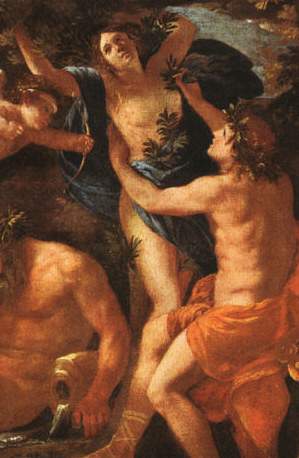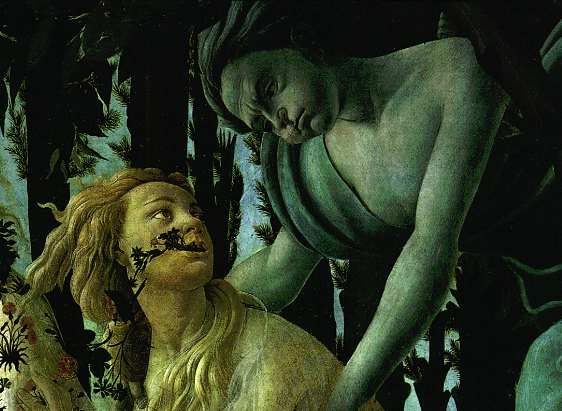Mythologies

|
|---|
Daphnea, the first love of Apollon
Daphne, daugther of the god-river Penea, was the first love of Apollo; this love was not the object of hazard, but of the relentless anger of Cupid.
He went landing on the dark summit of the Parnassus; then, he drew two arrows from his quiver intended at two all opposed works: one make you escape, the other give birth to love. From the first, the god reached the nymph daugther of Penea; but from the second, it wounded Apollon, transpercing his bones to marrow. At once, one loves; the other flees the name of lover; rival of the virgin Phoebe, she only likes the obscure retirements of the forests, and the capture of the wild animals.
A strip retained its hair laid out without artifices. Many were those who pursued her, but her, pushing back their advances, rebellious to the husband whom she ignores, she journeys among the impenetrable forests, and is not concerned with what are, the hymena, love, the marriage. Often her father said to her: "You must, my daughter give me a son-in-law." Other times he said to her: "You must give me, my child, grandsons." But she pushes back with horror, these criminal thoughts , the thought of bridal copulations; her beautiful face covers then, with modest redness, and suspending herself, of her caressing arms, at the neck of her father, she says to him: "Grants me, cherished father, the joy of an eternal virginity. Her father has well, formerly granted to Diane." "Your charm, Daphne, prohibit to you what you wish, and your beauty opposes to your wishes. But since you want it as such, I give up to your prayer. One day Apollon saw Daphné, he liked her and he wished to have her, in spite of the contrary opinion of the oracles, to unite himself to her. She was hunting; her short dress came to her knees, her arms were naked and her hair in disorder. Her beauty, in spite of that, remained delightfull and Apollon thought: "What this would be, if she were suitably dressed and if her hair were capped!" He saw these brilliant eyes, similar to stars; this exquisite mouth, of which sight did not satisfy any more his desires; he praised the fingers, the hands, the wrists, the naked arms more than half naked; and, what was hidden to him, he imagined it still more beautiful the roundness of the flesh, the grace of a youthful breast. The nymph fled, faster than a light breath, she did not stop to the accents of the god who called her back:
"O nymph, girl of Penea, I beg you, stop! I do not pursue you as an enemy, ô nymph! You flee as the ewe flees the wolf, as the hind flees the lion, as the doves flees the eagle with a trembling wing, each one in front of its enemy like a fairy in front of Satyre." "It is love that launches me to your pursuit, unhappy whom I am! Do not fall on the ground, that the brambles do not leave their mark on these legs which must be saved from any wound, That I would not be for you the object of any pain. Hard for the feet are the places by where you precipitate your steps. Moderate, I beg you, your run, stop your escape, I will moderate my pursuit myself. Whom who loves you, however seeks to know it." "I am not a lout nor a shepherd; You do not know, imprudent, you do not know whom you flee, is it the reason for you to flee? It is me the Master of the delphic country, of Claros and Tenedos of the royal palace of Patara. I am the Lord of Delphes, Jupiter is my father and I love you." "Thanks to me the future is revealed; thanks to me, the cords of the lyre sing the verses. The arrow that I launch, always achieves its goal, that which came to wound your unoccupied heart but there is an arrow, only one, impatient and which only aspires to sow your belly. Alas! my misfortune is that medicine cannot cure love, and it is of any profit for its Master, this science of which all and each one however benefit." He was going to say some more, but the daugther of Penea, frightened, gave herself away and left him there, him and his unfinished speech; She then offered still the spectacle of an indecent grace. Sha formerly had, heard the testimony given by the Nereides to Promethea whereas they visited him on his rocky peak of the Caucasus: "Could you ever oh, never see me sharing the couch of a god. That never does belong to me The love that gods knows. The fight against a divine lover is not a fight, It is despair."
The winds revealed her body, their breath which she faced raised her clothing she offered her naked flesh to the assault of the look, and the light breeze pushed back her hair; The escape embellished her still more. But the young god could not resign himself more longer to vainly exhausts himself in tender remarks, and, moved even by love, with a hurried pace he followed her traces. Exhausted, she faded and, succumbing to the tiredness of this fast escape, turning her eyes towards( the water of Penea, she exclaimed herself as follows: "Help me, my father, if you, rivers, have a divine power, and make me lose, by transforming it, this appearance which has worth for me, to allure the gods too much as do the mortals!"
As she achieve her prayer, here that a heavy torpor invades her members; her tender chest is wrapped with a thin bark, her hair lengthen in foliage, her arms in branches, her foot, so fast just before, is stopped on the ground by inert roots; her face, to the summit, disappears in the foliation. Only remains in her, the glare of her charm. Such, Apollon loves her still, and one hears her groan thuis way while she is metamorphosed under his eyes: "O most beautiful of the girls, you are lost for me! But you will be my tree and your leavex will beautify forever the face of the winners, the troubadours and the poets." And by posing his hand on a node where was her tender breast, he felt, under the bark, beat her heart. And surrounding her with his arms, as do the branches, he covered with kisses the bark at the place of the trunk where appeared a long wound in the shape of a triangle and the sap which escaped from it fills his mouth and solidified forever the trembling body of Apollo to the trunk of Daphne, the sleeping nymph.

Marco Polo or the imaginary journey (Mythologies, translated august 2000) © 1999 Jean-Pierre Lapointe
Ovide, the metamorphosis, and the paintings of the great-masters, music by Yokubota.
RETURN TO THE CHOICE OF MYTHOLOGIC ITINERARIES